Your How to read a soil texture triangle images are available in this site. How to read a soil texture triangle are a topic that is being searched for and liked by netizens today. You can Download the How to read a soil texture triangle files here. Find and Download all royalty-free photos and vectors.
If you’re looking for how to read a soil texture triangle images information connected with to the how to read a soil texture triangle interest, you have visit the ideal site. Our site frequently provides you with hints for seeing the highest quality video and image content, please kindly surf and find more enlightening video articles and graphics that fit your interests.
How To Read A Soil Texture Triangle. Properly classifying the soil in your yard or garden helps you. 3 What does a soil triangle tell you. A soil textural triangle is used to determine soil textural class from the percentages of sand silt and clay in the soil. Using your soil texture chart and example determine the following soil textures using the percentages given.
 Soil Texture Triangle 7 Download Scientific Diagram From researchgate.net
Soil Texture Triangle 7 Download Scientific Diagram From researchgate.net
2 How do you use a soil triangle. Soil texture triangle to estimate the soil type for the site. All your percentages should add up to 100. Texture influences water-holding capacity drainage aeration organic matter content and other properties. The USDA classifies soil types according to a soil texture triangle chart which gives names to various combinations of clay sand and silt. Soil texture can be determined using qualitative methods such as texture by feel and quantitative methods such as the hydrometer method based on Stokes lawSoil texture has agricultural applications such as determining crop suitability and.
The textural triangle is a diagram which shows how each of these 12 textures is classified based on the percent of sand silt and clay in each.
The clay percentages are listed on the left side of the triangle. A 30 10 60 Silt Clay Loam. Larger particles will have less surface area per volume of soil. The differences in horizons may be due to. Soil Textural Triangle Practice Exercises Sand Silt Clay Texture Name. Soil Texture Worksheet Key Directions.
 Source: study.com
Source: study.com
Soil is a material that is composed of organic matter minerals air and water that covers the crust of the earth in. It is related to weathering and rocks as parent materials. 4 What are the 3 sides of a soil triangle. Use the soil texture triangle to estimate the soil type for the site. A soil textural triangle is used to determine soil textural class from the percentages of sand silt and clay in the soil.
 Source: researchgate.net
Source: researchgate.net
A common soil science and agricultural tool the soil texture triangle uses the percentages of sand silt and clay in the soil to assign it to one of 12 textural classes. THE SOIL TEXTURAL TRIANGLE PRACTICE 4. 7 How do you calculate soil percentage. The soil texture pyramid paired with a simple soil jar test can help you to identify what type of soil you are dealing with on a particular site. How To Read Soil Triangle.
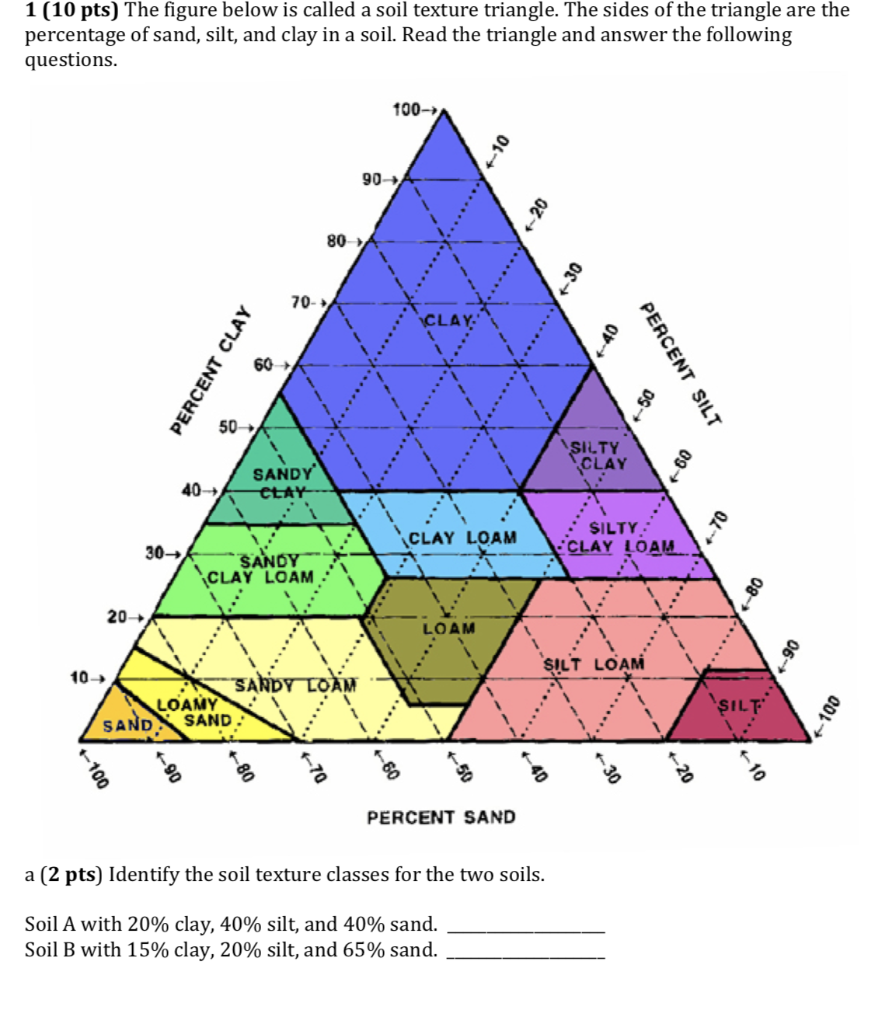 Source: chegg.com
Source: chegg.com
10 83 7 _____ c 20 20 60 _____ Soil Texture Worksheet. This video shows you how to classi. Texture influences water-holding capacity drainage aeration organic matter content and other properties. Using your soil texture chart and example determine the following soil textures using the percentages given. THE SOIL TEXTURAL TRIANGLE PRACTICE NOTES 1.
 Source: youtube.com
Source: youtube.com
How To Read Soil Triangle. The optimal soil hydraulic classes were represented in a ternary diagram called the soil hydraulic triangle. Use the soil texture triangle to estimate the soil type for the site. All your percentages should add up to 100. How To Read Soil Triangle.
 Source: researchgate.net
Source: researchgate.net
A common soil science and agricultural tool the soil texture triangle uses the percentages of sand silt and clay in the soil to assign it to one of 12 textural classes. B 60 30 10 _____. THE SOIL TEXTURAL TRIANGLE PRACTICE 4. The Soil Triangle is a commonly used visual representation of the possible soil type combinations based on soil particle size. Using your soil texture chart and example determine the following soil textures using the percentages given.
 Source: pinterest.com
Source: pinterest.com
Soil texture is a classification instrument used both in the field and laboratory to determine soil classes based on their physical texture. 3 What does a soil triangle tell you. A 30 10 60 Silt Clay Loam. 10 83 7 _____ c 20 20 60 _____ Soil Texture Worksheet. It is related to weathering and rocks as parent materials.
 Source: researchgate.net
Source: researchgate.net
If the percentages of clay silt and sand in a soil are known primarily through laboratory analysis you may use the textural triangle to determine the texture class of your soil. Soil Texture Worksheet Key Directions. And on the bottom we have the percent of sand. B 60 30 10 _____. 1 How To Read Soil Triangle.
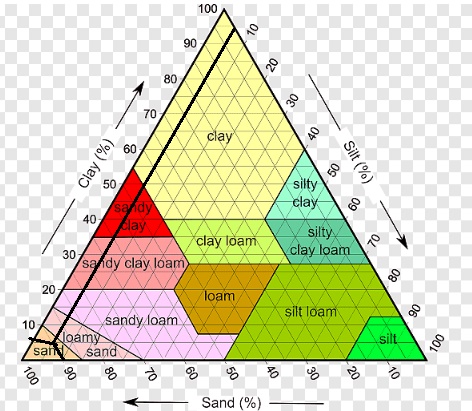 Source: community.appinventor.mit.edu
Source: community.appinventor.mit.edu
THE SOIL TEXTURAL TRIANGLE PRACTICE 4. 8 How do I know what type of soil I have. The clay percentages are listed on the left side of the triangle. 1 How To Read Soil Triangle. Soil texture triangle to estimate the soil type for the site.

Soil Texture Worksheet Key Directions. A texture triangle is then used to read off what the textural class is. And on the bottom we have the percent of sand. Using your soil texture chart and example determine the following soil textures using the percentages given. A soil texture triangle is used to classify the texture class of a soil.
 Source: youtube.com
Source: youtube.com
5 What would you call a soil with 30 clay 40 silt and 30 sand. Soil Textural Triangle Practice Exercises Sand Silt Clay Texture Name a 75 10 15 sandy loam b 10 83 7 _____. 201 at Loganville High School. Now it is your turn to use the Soil Texture Triangle. Textural class can be read from the textural triangle Figure 1.
 Source: figshare.com
Source: figshare.com
View Soil_Texture_Triangle_Practicedoc from SS. It is related to weathering and rocks as parent materials. 37 How to read a soil texture triangle. Use the soil texture triangle to estimate the soil type for the site. And on the bottom we have the percent of sand.
 Source: researchgate.net
Source: researchgate.net
If the percentages of clay silt and sand in a soil are known primarily through laboratory analysis you may use the textural triangle to determine the texture class of your soil. The differences in horizons may be due to. 10 83 7 _____ c 20 20 60 _____ Soil Texture Worksheet. View Soil_Texture_Triangle_Practicedoc from SS. 8 How do I know what type of soil I have.

And on the bottom we have the percent of sand. The optimal soil hydraulic classes were represented in a ternary diagram called the soil hydraulic triangle. And on the bottom we have the percent of sand. The Soil Triangle is a commonly used visual representation of the possible soil type combinations based on soil particle size. Now it is your turn to use the Soil Texture Triangle.
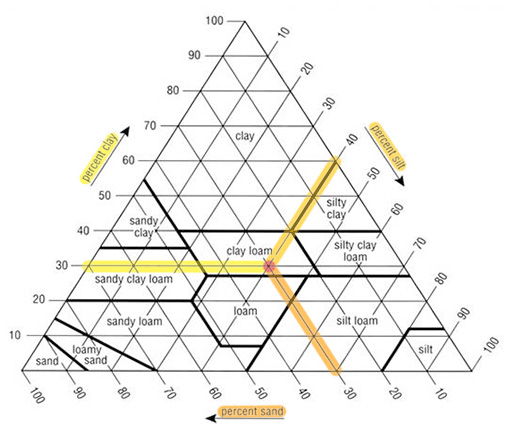 Source: ameliamurtha.wordpress.com
Source: ameliamurtha.wordpress.com
Now it is your turn to use the Soil Texture Triangle. Soil texture is the proportion of particle sizes that make up the soil. Use the soil texture triangle to estimate the soil type for the site. 8 How do I know what type of soil I have. The Soil Triangle is a commonly used visual representation of the possible soil type combinations based on soil particle size.
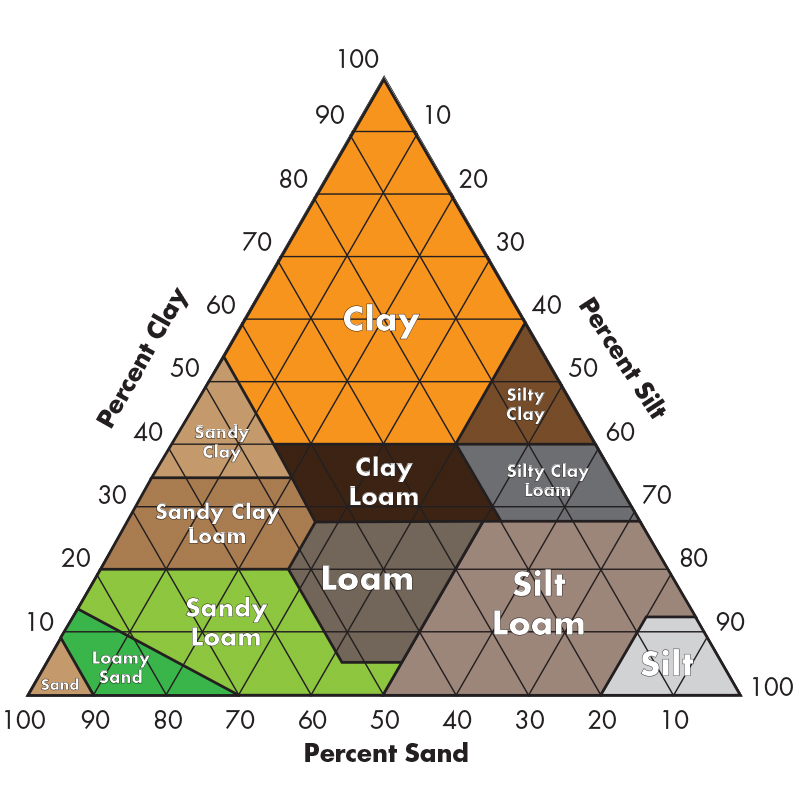 Source: littlegreenbucket.com
Source: littlegreenbucket.com
And on the bottom we have the percent of sand. And on the bottom we have the percent of sand. A 30 10 60 Silt Clay Loam. Lines corresponding to clay percentages extend from the percentages reading left to right see red line. Now it is your turn to use the Soil Texture Triangle.
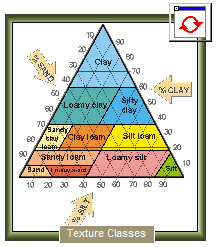 Source: nzsoils.org.nz
Source: nzsoils.org.nz
Larger particles will have less surface area per volume of soil. All your percentages should add up to 100. The soil texture pyramid paired with a simple soil jar test can help you to identify what type of soil you are dealing with on a particular site. The textural triangle is a diagram which shows how each of these 12 textures is classified based on the percent of sand silt and clay in each. 2 How do you use a soil triangle.
 Source: study.com
Source: study.com
The optimal soil hydraulic classes were represented in a ternary diagram called the soil hydraulic triangle. The clay percentages are listed on the left side of the triangle. 2 How do you use a soil triangle. Soil texture can be determined using qualitative methods such as texture by feel and quantitative methods such as the hydrometer method based on Stokes lawSoil texture has agricultural applications such as determining crop suitability and. Another method is to gradually wet the soil and while rubbing it between the fingers estimate the percentage of sand silt and clay based on how gritty or sticky the sample feels.
 Source: youtube.com
Source: youtube.com
Textural class can be read from the textural triangle Figure 1. Soils is a super important topic in permaculture and understanding what is already on the ground is a good starting point. Soil Texture is one of the first things determined when a soil is examined. And on the bottom we have the percent of sand. View Soil_Texture_Triangle_Practicedoc from SS.
This site is an open community for users to submit their favorite wallpapers on the internet, all images or pictures in this website are for personal wallpaper use only, it is stricly prohibited to use this wallpaper for commercial purposes, if you are the author and find this image is shared without your permission, please kindly raise a DMCA report to Us.
If you find this site convienient, please support us by sharing this posts to your preference social media accounts like Facebook, Instagram and so on or you can also bookmark this blog page with the title how to read a soil texture triangle by using Ctrl + D for devices a laptop with a Windows operating system or Command + D for laptops with an Apple operating system. If you use a smartphone, you can also use the drawer menu of the browser you are using. Whether it’s a Windows, Mac, iOS or Android operating system, you will still be able to bookmark this website.






